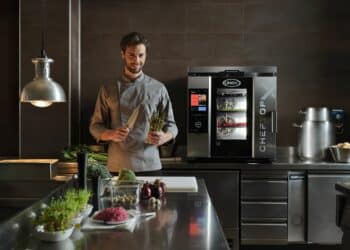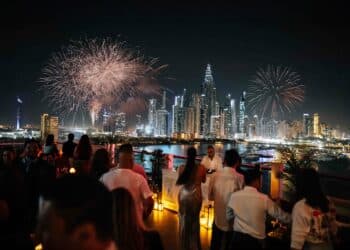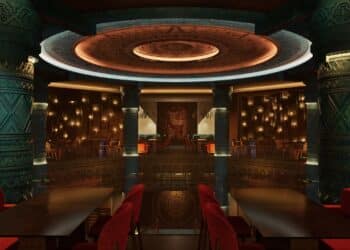CEO of Jannah Hotels and Resorts, Nehme Imad Darwiche tells Hotel News ME why the core of his business strategy is formed around the traditions of Bedouin hospitality and the importance of cultural hospitality in an overcrowded market. 
It’s not often that you hear about a 31-year-old self-made CEO running the show, but Nehme Imad Darwiche is a stark exception to the rule. Through various leadership roles within the hospitality industry he has earned his title with more than a decade worth of industry experience under his belt.
Having worked for some of the leading hospitality brands in the region including Starwood, Anantara and Rotana he now spearheads the team at Jannah Hotels and Resorts, aiding the steady paced expansion of the brand in the region.
With two existing properties in Dubai and two in Abu Dhabi, Jannah Hotels and Resorts recently unveiled plans to expand with an additional property in Dubai Creek scheduled to open in 2018.
You climbed the career from F&B manager to learning about real Bedouin hospitality at Qasar Al Sarab, how did these roles place you in good stead for your current position?
I have held several leadership roles with local and international management companies, and my best lessons in hospitality came from the noble Bedouins of the Liwa Desert. I am lucky enough to have had the pleasure of meeting the elders of a renowned tribe called Manasi. It was through them that I discovered a new approach to hospitality. They would put the food, which they hardly had enough of, in front of the guest and let them eat comfortably. Only after the guests are satisfied would they then begin to eat. When I saw this type of hospitality, which was essentially meeting the needs of your guests before your own, I decided to become an ambassador of the noble Bedouin culture, which is now at the soul of Jannah Hotels and Resorts.
What is the latest on Jannah’s regional footprint and pipeline?
We have just recently broken ground on our seventh hotel, Jannah Creek Dubai where we on making the reception check-in queue a thing of the past. Essentially, travellers arriving at the hotel will be greeted by one of Jannah’s renowned Karim – the guest’s very own personal genie – who will carry out the check-in on a tablet device as he shows them to their room.
We will soon be launching a new budget brand called BedoInn, aimed at the millennial market. The name is a play on Bedouin hospitality, which I consider core to all of our hotels’ service values. The budget travel brand will provide a modern and accessible traveller experience.
There are also a few more projects in the pipeline across the UAE which we will announce in due course.
Where are your main source markets for business and why?
Jannah caters to individual guests, frequent business travellers, and small corporate and executive meetings spanning a wide range of industries and organisations. In addition, we are the place to stay for local families as well as leisure travellers from the GCC visiting Abu Dhabi.
Our guests are mid- to upper-income level travellers who expect a full spectrum of personalised services tailored to individual needs and the convenience of staying in a lodging product designed to reflect the feeling of home.
What factors do you expect will drive revenue, demand and occupancies to the properties over the next 12 months?
Halal tourism is beginning to gain traction and hoteliers are now only beginning to recognise this segment as a lucrative market. As one of the first hotel groups to introduce a halal tourism-friendly environment, we are confident that Jannah Hotels and Resorts will help put Abu Dhabi in the global spotlight as the leading halal travel destination in the region.
Also, an in-depth study of the Abu Dhabi market identified a continuing lack of apartments in the capital, putting upward pressure on rental prices and limiting options for residents and visitors. Following this, we launched 110 serviced studio apartments onto Abu Dhabi’s undersupplied property market.
What are your top priorities in your role and for the year ahead?
Stability. The defining factor of a successful business is its ability to withstand temporary problems – whether it is in relation to fluctuation in occupancy, the company’s operational needs or even the number of employees.
Even when I look for properties for potential future projects, I check if that location will offer a long-term return on investment. It is important to me that my business will provide a sustainable boost to the local economy and community through jobs, tourism and inward investment. I am equally committed to ensuring that all of our properties and initiatives are as environmentally friendly as possible. Of course, it is only natural that I am also constantly looking at expanding Jannah Hotels and Resorts. But my focus is on developing this Abu Dhabi-based brand to such a level that it becomes known and preferred on a global scale.
What are the key facets of your 2016-2017 sales and marketing strategy?
Flexibility plays a major role in our sales and marketing strategy. Linked with the operations team, flexibility gives Jannah the ability to introduce new products, adjust capacity rapidly, and customise products. Being adaptable to situations helps our brand and properties efficiently deal with the turbulent environment that the hospitality industry is prone to.
Jannah talents are the greatest believers in social media and we engage on all our social media handles including Periscope on a daily basis. According to in-house protocol, the brand ambassador of each hotel needs to work on the social media handles once a day. Through this exercise, we echo the brand message to a bigger audience.
What opportunities are there for the Jannah brand to expand its Middle East presence going forward?
When I first launched Jannah, I identified a market opportunity in luxury serviced apartments. There were a handful of businesses that offered these services at the time. Instead of beating the competition, we changed the rules of the game and went ahead by offering a whole new design of service. We created urban resorts embedded in an apartment hotel complex and complemented the suites inspired by luxurious hotels with the unique Karim services.
It has been three years since the launch of Jannah Eastern Mangroves Suites and we continue to be leaders in this sector. The secret is in updating yourself with the latest trends in the market, understanding your target sector and then catering to their needs.
Our vision is to tap into the international market, and to expand halal tourism around the globe. As a brand that was born and inspired in Abu Dhabi, the objectives of the country and the Jannah brand complement each other’s growth. Abu Dhabi is already on track to deliver international marketing initiatives with leading halal travel partners and is poised to become the regional hub for this lucrative halal travel sector. We are proud to be one of the first to cater to this niche segment and to have halal-friendly services as an underlying principle of Jannah as a brand.
What is your long term growth plan for Jannah in the region?
Having worked with great management companies, I’ve learnt that preparation is the first step before identifying your target market. So when I work on expanding Jannah Hotels and Resorts, I am not driven by greed – instead I am led by my love and passion for the industry.
As Jannah Hotels and Resorts is owned by corporate executives, our growth has been steady since the launch of Jannah Eastern Mangroves Suites in 2013, with milestones such as our 5-star Jannah Burj Al Sarab which opened in 2015, and our upcoming hotel in a premium area in Dubai for 2018.


































































